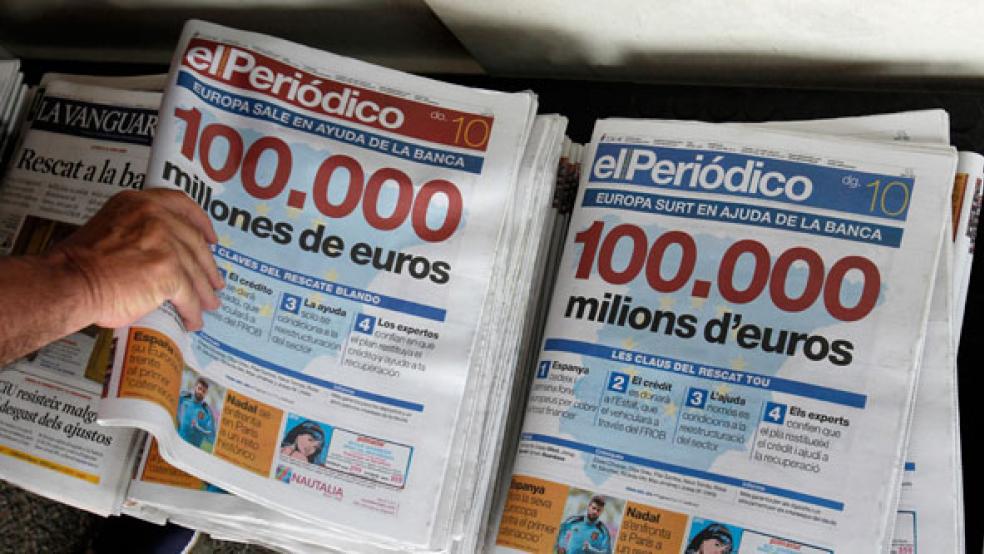LONDON—As recently as last Friday Spanish officials, including Finance Minister Luis de Guindos, were offering investors and the markets sanguine reassurance that, no, there would be no need for a European rescue plan for Spain’s ailing banks. Spain could handle it alone.

Prime Minister Mariano Rajoy had already proved the point late last month, when he unveiled a $19 billion bailout package for Bankia, one of the nation’s most troubled institutions.
That was then. Over the weekend, Madrid announced it would accept a European bailout of $40 billion to $125 billion to pull its banking sector out of the depths, even though nobody knows how much will be needed. The larger figure would wipe out a fifth of the EU’s new rescue fund, the European Stability Mechanism, before the ESM officially begins operating in July.
This is getting scary. Spain now joins Greece, Ireland, and Portugal in requesting European aid to bail out its banks. But Spain, as the fourth-largest EU economy, is in the too-big-to-fail category. Another concern is the timing. Skittish investors have been taking capital out of Spain for weeks, with the Greek crisis and the teetering banks in view. Some analysts consequently question whether even $125 billion will prove enough in the end.
When Rajoy announced recently that Madrid could handle the banking crisis by itself, he wanted to reassure markets that Spain was not another Greece. He also wanted to avoid any move that would even hint at the wisdom of capital flight. As it now turns out, Rajoy has failed in both endeavors. The most compelling question in the markets now is, “Where will the contagion strike next?”
“When financial markets open today, traders will have to decide whether they are reassured that eurozone leaders have opted to act, or whether to start worrying about which country will be next,” says Heather Stewart, business editor at The Observer in London. “Italy, widely seen as the next domino to fall, could come under concerted attack.”
For the moment, all eyes will remain on Spain because that is where the music has finally stopped. Europe has been pulling in two directions since socialist François Hollande’s election as president of France a few weeks ago. Hollande has proven courteous but firm in advancing his growth-first agenda. Next door, German Chancellor Angela Merkel is sticking to her austerity policies but looking more and more isolated because of her unaltered position.
We now know that Spain is likely to be the proving ground for the direction Europe settles upon. On one hand, it has threatening bank debt—residue of an immense housing bubble gone bust—that has to be recapitalized.
On the other hand, it has unemployment of almost 25 percent (and youth unemployment of 50 percent-plus) and falling wages, which means even those employed cannot afford to spend. Cutbacks in health care and education have become a common feature of life in Spain since Rajoy, a conservative, was elected last December.
What we do not know is what conditions will accompany the EU’s bank bailout funds. Reports here have suggested there was heated discussion of this prior to the weekend announcement of the EU’s new commitment. But no one has yet said how the EU will lend these funds except to note that Brussels will closely monitor Spain’s capacity to achieve fixed deficit targets and structural reforms.
That suggests that the Spanish are in for yet more austerity. But the Spanish announcement comes at a critical moment: The EU plans a summit later this month, and it is would be good for all of us, not just Europe, if it can unveil a plan for the Continent that makes plain its ability to act in concert and address the whole of the European crisis with a persuasive strategy. That plan should move Europe closer to a fiscal and banking union, at a minimum. Lurching from crisis to crisis cannot go on indefinitely—not if the markets are going to settle down and Europeans are to get on a track leading to at least modest growth.





